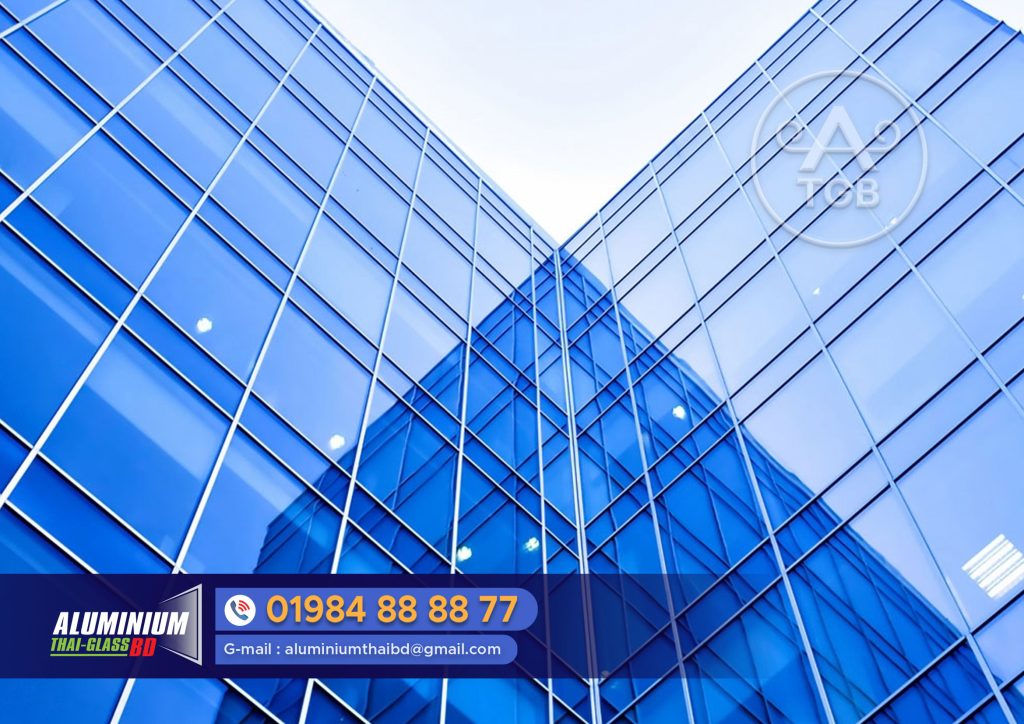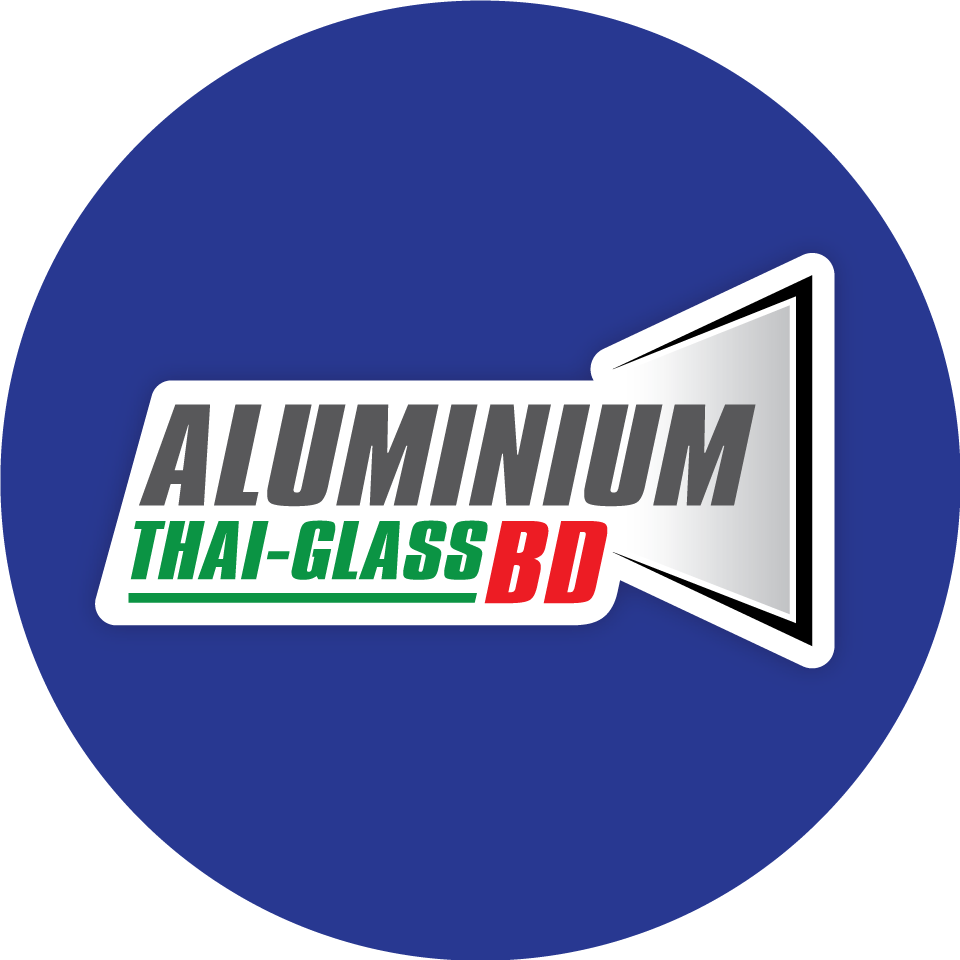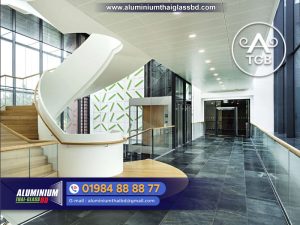A high-rise with a glass exterior. Glass has become one of the main materials used for building exteriors. Interiors these days for aesthetic. Gone are the days when people used glass for just windows. Glass has become one of the main materials used for building exteriors these days. Since just last century. South Asian households have started to replace the iron rod and wooden windows with clear glass. Even before, the use of glass was limited to making doors, door sills, Aluminium Thai Glass B and windows of different architectural buildings. Which may include mosques, churches, and museums in Bangladesh. However, growing urbanization changing tastes. Building patterns have increased the use of different types of glass in Bangladesh these days. Now, in a city of shopping malls and high-rise buildings that architectural congestion. It is no wonder why people use more glass to get adequate sunlight, be it at the office or home. Cutting wall glass Thai Aluminum Glass Design in Bangladesh

Aluminium Thai Glass BD. A designer at an interiors company in Mazar Road. Mirpur, Bangladesh, said the use of glass has increased manifold, for both the exteriors and interiors, mainly for office buildings. “These days, most entrepreneurs have a very small space for setting up an office. We think about the maximum use of the sources of light. To make the place look more spacious than it actually is,” he said. “We naturally prefer glass over wood and other metal components. Because glass provides clear light that makes the entire space roomier. And that’s the basics of the contemporary ‘Open Office’ concept,” he added. Apart from using glass for walls and doors that eliminates windows from modern offices. People are also opting to use glass to make certain furniture and partitions days.
Glass Partition Wall In Bangladesh
“For interiors, the entry to a particular floor is primarily very important, where now almost everybody uses tempered glass doors. Also, many prefer decorating their offices by using glass brick walls next to the door,” said Aluminium Thai Glass BD. Therefore, the demand is high. It is further backed by the country’s booming real estate. Ccorporate sector that started growing mainly in the last decade. Local entrepreneurs are more than eager to cater to this growing demand. According to insiders, entrepreneurs started thinking about manufacturing glass locally by the end of 2021. They noticed the growth in the real estate sector and the dearth of quality glass in the market. Previously the market was completely dependent on imported glass. While now, it imports less than 5 percent of its total demand. The demand for imported items is high for colored and luxuriously designed glass from China, Thailand, and Indonesia.
Glass Door Cutting Wall Glass Spider Glass
There are four companies operating in the local market Nasir Glass Industries Ltd. PHP Float Glass Industries Ltd. Osmania Glass Sheet Factory Ltd, and MEB Glass Industries. Among the four, Nasir Glass Industries is the largest manufacturer of float glass. Nasir and PHP produce float glass and the rest produce sheet glass. At present, the demand is growing at a rate of 15 percent a year. While the demand for different types of glass stands at 550 tonnes a day. “The demand for glass as a construction material is growing. Hand-in-hand with the growth of the real estate sector across the country and the corporate sectors in Dhaka. Now, the demand is growing at 15-20 percent a year,” said Aluminium Thai Glass BD. General manager (commercial and banking) of Nasir Glass Industries Ltd (NGIL).
Top Wall Glass Cutting Company In Bangladesh
BD said NGIL manufactures nearly 92,000 tonnes of glass. Including float glass, reflective glass, tempered glass, coated glass, mirrors, and clear and colored glass a year. The company can produce as much as 20mm of thick glass. While the maximum capacity of the other companies is 12mm. PHP Float Glass Industries started commercial production in 2005.The company accounts for over 20 percent of the total market share. “We are the first company in the country to manufacture float glass. Thickness ranging between 2mm and 12mm,” said Zahidul Islam, a sales executive of PHP. He said PHP produces around 65,000 tonnes of float glass a year. Plans to enhance capacity further In addition to meeting local demand. The companies are now exporting their products to different countries, mainly to neighboring nations. Nasir Glass Industries Ltd exports to India, Nepal, Bhutan, Sri Lanka, Kenya, Australia.
“Sixty percent of our produce is sold in the local market, while the rest 40 percent is exported. To enhance exports, we are working to find new export destinations. Including the US and the oil-rich Middle East countries,” said Sayed of NGIL. Despite the overall success. The industry as a whole is facing some difficulties that need to be addressed, the insiders said. They said the main hurdle to growth is an energy crisis. Which often makes companies suspend production and make workers.
Thai Aluminum Glass Design in Bangladesh
Also, the import duty on raw materials is still very high, which the government is yet to act upon. Industry leaders have long been urging the government to prompt action. Most raw materials, including dolomite, limestone, and chemicals, for float and sheet glass, need to be imported. However, specialized sand, another essential material for producing glass, is available in the local market. The general manager of NGIL identified the weak transportation system as a major problem in the sector. He urged the government to take steps to ease the border difficulties to smoothen. The shipment of consignments, as glass is usually exported through the borders. Industry insiders also suggest the government provide export incentives for the sector at an enhanced rate. They cited an example from China, where the sector receives an incentive of 25 percent.
Cutting Glass Design in Bangladesh
The government currently gives around 5 percent as an incentive to the export sectors. But these problems cannot hold back the innovators. NGIL plans to expand operations further and open a new factory in a year or two. Depending on the gas and electricity situation, said Sayed. The country will receive huge new investment from both local and foreign entrepreneurs within the next three years. As the market will grow further. And we hope to be a part of that,”



